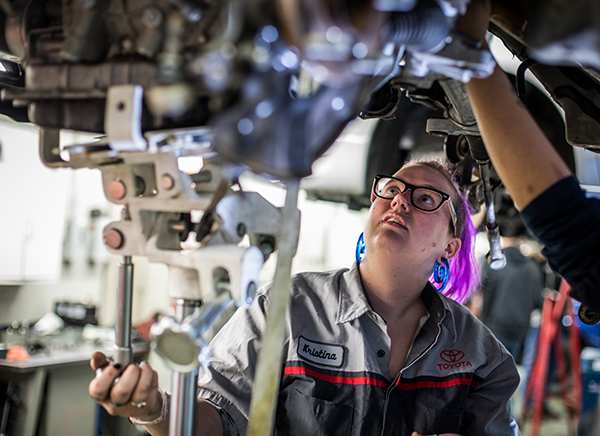By Maggie Whitman, Associate Director of Women’s Initiatives, Dunwoody College of Technology
Historically low levels of unemployment has led Minnesota companies to place an even greater importance on their ability to recruit and retain workers.

Gene Rebeck discusses this trend in the December issue of Twin Cities Business and identifies three key areas for companies to focus on: building team morale, tapping hidden pools of talent, and linking company values with their work. While Dunwoody places importance on all three of those areas, where we can most help the local business community is not only finding — but also developing — nontraditional pools of talent.
Specifically, as Women’s Foundation of Minnesota vice president Saanii Hernandez noted in the article, “there are pockets of young women who, we think, aren’t being utilized like they could be.”
Dunwoody College agrees. And we were delighted that Hernandez also mentioned the Women’s Foundation’s support of our Women in Technical Careers (WITC) initiative. Without support from donors and grant makers like the Women’s Foundation, WITC wouldn’t be the successful program it is today with 100% of our 2017 and 2018 graduates working full-time in their field.
And we want to build on that success. Women continue to be under-represented in technical careers. And we can’t do it by ourselves. What we can do, though, is share what we’ve learned from the success of our women’s initiatives.
Broadening Perceptions of What’s Possible
Occupational clustering — where women are more likely to enter what are called “the caring professions,” such as health care and education — is a key factor in the wage gap between men and women. There are many reasons such clustering persists, but a major one is that girls and young women simply aren’t made aware of the breadth of jobs available in the technical fields and aren’t encouraged to pursue STEM-related careers. This perpetuates the wage gap between men and women and limits the pool of workers with technical skills.
Dunwoody has partnered with groups like the Girl Scouts and Girls Inc. to increase that awareness, holding events that introduce young women to 3D printing technologies, electrical wiring, construction planning, robotics, and engineering.
Such outreach is important as it gets participants excited about STEM. But especially as girls get older, technical careers need to be presented as something that’s consistent with their interests and values. In particular, women tend to seek careers where they feel they are helping people and making the world a better place.
The discourse around technical careers tends to focus on the cool technologies and the good pay while ignoring the positive impact that individuals can have by utilizing technology and creative problem-solving to address social and environmental issues. As we talk to women about Dunwoody’s program offerings, we emphasize those connections and find that our students bring extra motivation to their studies as a result.
A Holistic View of Support
Dunwoody’s WITC participants receive scholarships of up to $10,000 per year. Such financial support is crucial—these students wouldn’t be able to attend college without it—but it is not sufficient. The pockets of young women Hernandez mentioned in the Twin Cities Business article are often low-income, single parents, and/or women of color. Even when tuition is covered by financial aid and scholarships, additional financial support is often needed for child care, transportation, and housing.
Just as important to student success is academic, social, and emotional support.
At Dunwoody, each incoming class of WITC participants form a cohort that meets together for a summer orientation as well as monthly professional development activities during the school year. As the cohort participants get to know each other better, their relationships extend beyond formal activities so that students have a social and emotional support network of other women who can offer guidance during tough times as well as celebrate their successes. Such support can make all the difference, especially—as is so often the case in the U.S. — when there are one of only a handful of women (or fewer) in their STEM major.
WITC participants also have regular one-on-one advising meetings with me and other targeted support, including academic tutoring, as needed.
Workplace Readiness
At Dunwoody, our WITC participants are formally mentored by female professionals from the technical sectors. We want to make sure that they have strong role models and augment their technical skills with the communication and political skills to navigate workplace issues like salary negotiation and career advancement. Mentors also help students with advice on career paths and specializations as well as how to continue to grow as professionals so they are well-equipped to get over the three to five year hump that happens for people, especially women, in technical careers.
In addition, we provide students access to internships and part-time job opportunities starting in their first year. It’s important that women get early experiences with technical workplaces. That will give them a better idea of which career tracks are most interesting to them and what types of corporate cultures they will fit best into.
More to Be Done
While Dunwoody’s Women in Technical Careers program is a success, there’s still so much more to be done. Two things, in particular, come to mind:
First, we need to start even younger. In our experience, most of the women who find their way into technical careers have some sort of connection to designing, building, or fixing things in their childhood that planted that seed in the back of their mind. Elementary and middle school children should not only have exposure to STEM technologies, but should also have hands-on experiences with those technologies and explore how they connect with technical career paths.
Second, we need companies, unions, and industry organizations to continue to evolve their culture to be welcoming of people of all genders, sexual orientations, and racial and ethnic backgrounds. Women entering technical careers are not looking for a free pass. But too often they still experience hazing, pigeonholing, or a glass ceiling. There’s no excuse for sexual harassment and discrimination. And no reason why life-work balance, professional growth opportunities for all, and a commitment to diversity shouldn’t be core values for every modern workplace.
Economic and demographic factors mean that Minnesota companies have no choice but to embrace a modern, diverse workforce. Focusing on untapped pools of talent is needed immediately and in the future. At Dunwoody, we’ve found that women are ready and excited to get the training needed for long, successful technical careers. They just need to know what’s possible and get the support they need to reach their goals.
